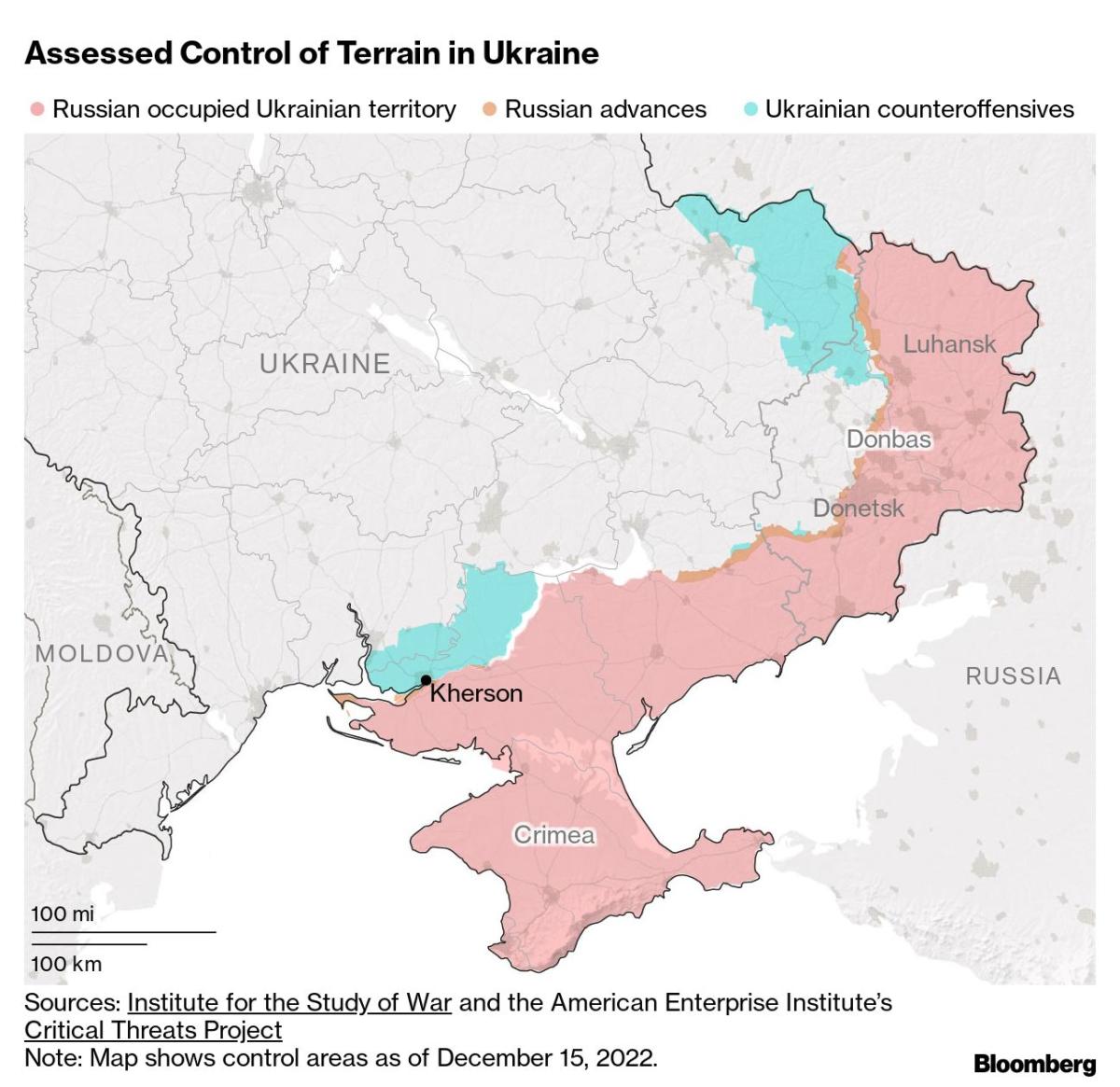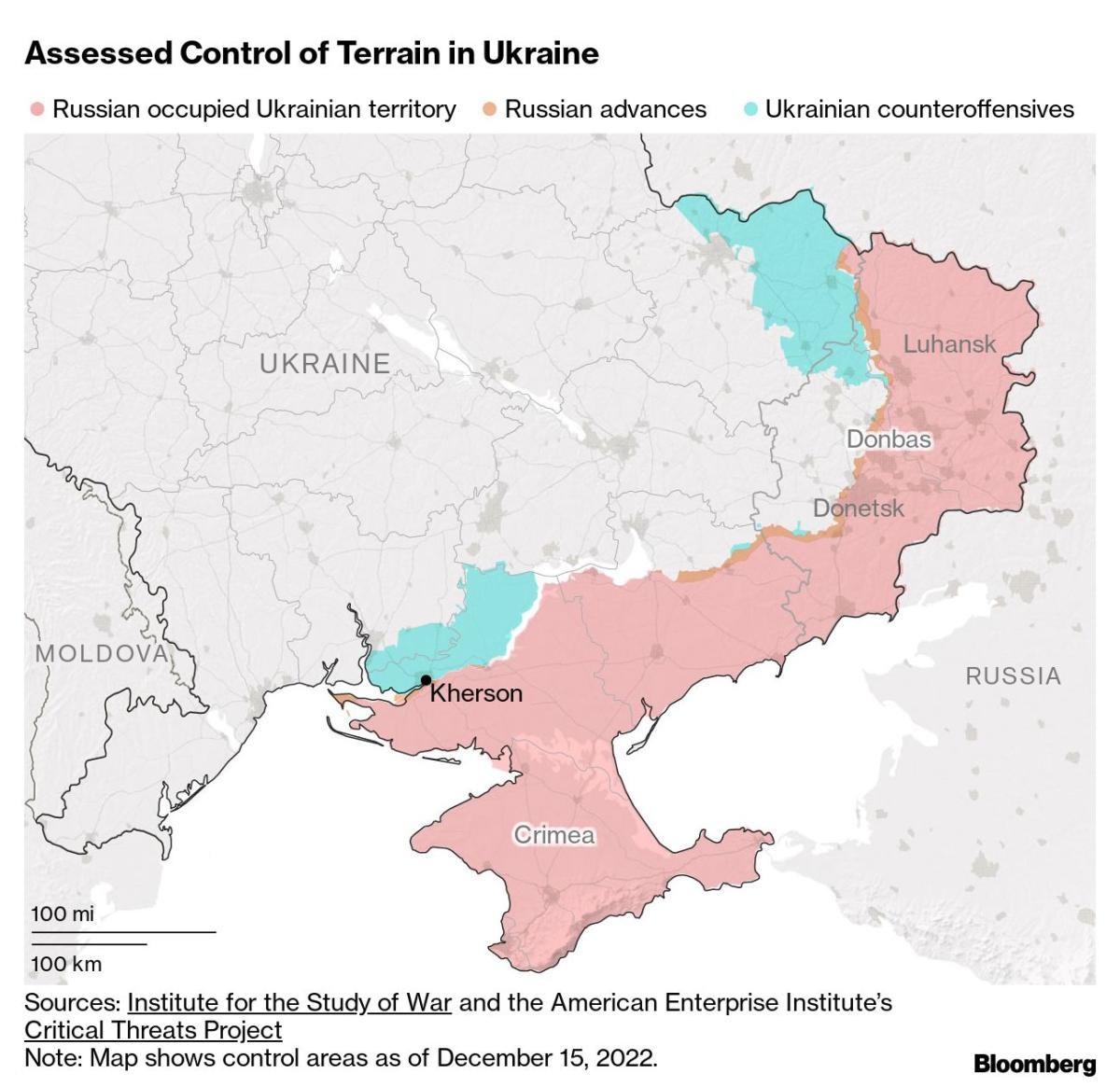
(Bloomberg) — Gazprom PJSC’s exports to its key foreign markets declined by almost half this year as the Russian natural gas giant’s flows to Europe were slashed following President Vladimir Putin’s invasion of Ukraine.
Most Read from Bloomberg
Ukrainian President Volodymyr Zelenskiy said he had discussed the postwar rebuilding effort with BlackRock Inc. Chief Executive Officer Larry Fink as his government prepares to participate in the World Economic Forum in Davos next month. He didn’t say whether he would attend the Jan. 16-20 forum in person or participate virtually.
Addressing lawmakers in Kyiv, Zelenskiy called for the Ukrainian energy system, which has been targeted by multiple Russian bombardments in the last few months, to be decentralized, saying it’s dangerous when cities depend on several big plants.
(See RSAN on the Bloomberg Terminal for the Russian Sanctions Dashboard.)
Key Developments
-
Russian Billionaire Urges Africa to Press EU on Fertilizer Snarl
-
Ship Insurers’ Exodus From Russia-Ukraine Trades Gathering Pace
-
Russia Leaves Its Options Open for a Tougher Response to Oil Cap
-
European Gas Swings After Hitting 10-Month Low Amid Mild Weather
-
Oil Dips From Three-Week High in Choppy Holiday Trading
On the Ground
Ukrainian air-defense forces have downed 420 Russian rockets and 430 drones since September, spokesman Yuriy Ihnat said on television, adding that the military was ready for more potential strikes. Zelenskiy and other officials have warned that Russia may stage a new attack during New Year holidays. The only areas where Russian forces are trying to advance currently are in the Donetsk region near Bakhmut, Avdiyivka and Lyman, according to Ukraine’s General Staff.
(All times CET)
Russian Ministry Calls for Military Courses in Universities (7:03 p.m.)
Russia’s Ministry of Science and Higher Education is calling for universities to include courses on the main elements of military preparation in programs for the academic year starting Sept. 1, the state-run Tass news service reported.
Prime Minister Mikhail Mishustin ordered Tuesday that military centers attached to state universities be set up in 16 regions, according to Tass.
Zelenskiy Calls for Overhaul of Ukraine’s Energy System (5:11 p.m.)
Ukraine should use green energy in the future to build a decentralized energy system that can’t be destroyed by missile strikes, Zelenskiy said in the aftermath of Russian attacks against critical infrastructure.
The president also pledged during his end-of-year address to parliament to boost the number of Starlink satellite antennas operating in Ukraine to more than 30,000, as well as to complete the “total digitalization” of government services. Mykhailo Fedorov, deputy prime minister and minister for digital transformation, said earlier this month that Ukraine had received about 22,000 of the devices since the war began in February.
Russian Gas Giant’s Exports at Lowest This Century (3:33 p.m.)
Gazprom sent 100.9 billion cubic meters of natural gas to countries outside the former Soviet Union this year, Chief Executive Officer Alexey Miller said Wednesday, according to a transcript of his comments on the company’s Telegram channel.
While that figure represents a 46% drop from 2021, the company has been gradually increasing supplies to China, with daily volumes in December topping contractual levels and on some days reaching records.
Russia Flagship Crude Exports Drop 16% from November (3:28 p.m.)
Russia cut shipments of Urals oil from its three main western ports sharply this month, signaling the nation has had difficulty in replacing European buyers bound by sanctions. Urals exports dropped to 6.7 million tons, or 1.58 million barrels a day, in December, according to loading programs compiled by port agents.
Russia Expels Lithuanian Diplomat (2:38 p.m.)
The Russian Foreign Ministry said it’s expelling a Lithuanian diplomat in retaliation for a similar step by the government in Vilnius.
Lithuania ordered out a Russian diplomat for “activities inconsistent with diplomatic status” on Dec. 1. Russia and the US and its European allies have each expelled scores of diplomats in tit-for-tat moves since the Kremlin invaded Ukraine in February.
Ukraine Says Ferrexpo Owner Zhevago Detained in France (2:04 p.m.)
Ukrainian investigators said that Kostyantin Zhevago, the billionaire chief of iron-ore miner Ferrexpo Plc, had been detained in France on suspicion of money laundering and embezzling funds linked to his banking business.
Zhevago was detained at a hotel in the French ski resort of Courchevel on Tuesday by French police, the Ukrainian State Bureau of Investigation said in a statement. The necessary documents for his extradition are being prepared, the bureau said. Ukraine put him on the international wanted list in 2019.
Ports Damage Seen at Almost $400 Million: Official (12 p.m.)
Russian shelling has caused damage to port facilities in Greater Odesa and Mykolaiv worth at least $380 million, Ukrainian Sea Ports Administration chief Oleksii Vostrikov said in an interview published on the agency’s Facebook page.
Cargo volumes at Ukrainian ports slumped to 50.8 million tons in 2022, three times less than the previous year, according to Vostrikov. The total volume of grain shipped through Ukrainian ports will amount to some 15-16 million tons by the end of the year, Vostrikov predicted.
Russian Billionaire Warns on Fertilizer Snarl (11:15 a.m.)
Russian fertilizer billionaire Andrey Melnichenko is lobbying politicians in Africa to pressure the European Union into finding a solution to what he says are sanctions-related disruptions choking flows of food and vital crop nutrients.
While EU sanctions on Russia don’t target agricultural products or fertilizers, trade is still being affected. That’s curbed fertilizer shipments by about 9 million tons so far this year, said Melnichenko, the founder of EuroChem Group AG.
Russia Shells Gas Pipeline: Ukrenergo (11 a.m.)
Ukraine’s power deficit widened Wednesday due to Russian shelling of a gas pipeline in the country’s east, national grid operator Ukrenergo said on Telegram, without providing further details. At the same time, warmer weather continued for a fourth day, enabling the company to avoid imposing limits on power at night, according to the statement.
German Lawmaker Warns on Russian Spying Threat (8:45 a.m.)
The head of the German lower house of parliament’s intelligence oversight committee said the recent unmasking of an alleged Russian spy at the country’s foreign intelligence service suggests authorities have only been “half switched on” to the threat of infiltration by the Kremlin in recent years.
“What everyone needs to take on board is that there are still intense intelligence activities going on like during the Cold War, and at a time when Russia is conducting an illegal war against Ukraine we have to keep a very sharp eye on this,” Konstantin von Notz, a Bundestag lawmaker for the ruling Greens party, said in an interview with Deutschlandfunk radio. “I would be very pleased if this unfortunate case would prompt us to take a critical look so that we are in better shape for the future.”
Kyiv Power Supply Stable, Restrictions Persist (8 a.m.)
Kyiv’s electricity supply is limited but stable and is being evenly distributed through temporary grid reconnection measures, Serhiy Kovalenko, the head of power company Yasno, said on Facebook. It’s “difficult to predict” how reliably the equipment will cope with lower temperatures and higher consumption, he added, also pointing to the threat of Russian missile and drone attacks.
Emergency cutoffs will continue in the Ukrainian capital through the winter, the deputy head of Kyiv’s city administration, Petro Panteleev, said earlier on television. More than 300,000 Kyiv residents remained without power as of Wednesday morning, news website Kyiv.media quoted a deputy head of the city council as saying.
OHCHR Records Almost 18,000 Civilian Casualties (7:45 a.m.)
The Office of the United Nations High Commissioner for Human Rights has recorded 17,831 civilian casualties in Ukraine between the end of February when Russia launched its full-scale invasion and Dec. 26, including 6,884 killed and 10,947 injured.
“Most of the civilian casualties recorded were caused by the use of explosive weapons with wide area effects, including shelling from heavy artillery, multiple launch rocket systems, missiles and air strikes,” the OHCHR said in a statement. The actual figures are likely considerably higher, as information from some locations where hostilities are especially intense has been delayed and many reports are still awaiting corroboration, it added.
Deputy Minister Details Infrastructure Damage (7 a.m.)
About 700 critical infrastructure facilities in Ukraine, including gas pipelines, power substations and bridges, have been damaged since Russia invaded, according to Yevhen Yenin, a deputy interior minister.
In total, more than 35,000 facilities across the country have been destroyed as a result of Russian attacks, Yenin said on television late Tuesday.
(An item on fertilizers in a previous version of this story was corrected to remove a reference to self-sanctioning.)
Most Read from Bloomberg Businessweek
©2022 Bloomberg L.P.




